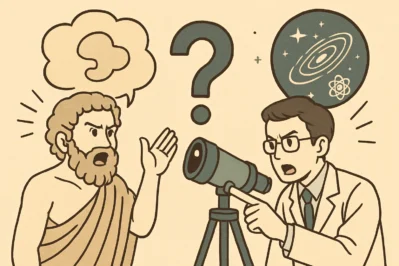Is Science Real? The Hot Philosophical Debate in Korea
Hello! Welcome to [Maeil Hangeul], the blog that will upgrade your Korean skills!
Have you ever looked up at the stars and wondered if things like black holes or quarks—things we can’t see—truly exist? Or are they just useful concepts that scientists invented? This isn’t just a question for physicists; it’s a hot topic in philosophy! Today, we’re diving into a high-level academic debate that’s buzzing in Korean universities: the clash between Scientific Realism and Anti-realism. Lately in Korea, with growing interest in space exploration and advanced physics, students and intellectuals are passionately discussing these fundamental questions. Learning the Korean terms for this debate will not only boost your vocabulary but also allow you to participate in deep, intellectual conversations. Let’s get started!
Core Expressions for Your Philosophical Toolkit
Here are the essential terms you need to navigate this fascinating debate like a pro.
- 과학적 실재론 (Gwahak-jeok Siljae-ron)
- Pronunciation [Romanization]: Gwa-hak-jjeok Sil-jjae-ron
- English Meaning: Scientific Realism
- Detailed Explanation: This is the philosophical position that a successful scientific theory is a true, or at least approximately true, description of the world. It asserts that the things science talks about, even unobservable things like electrons, actually exist independently of our minds. The word
실재 (siljae)means ‘real existence,’ and론 (ron)means ‘theory’ or ‘-ism.’ This is the viewpoint that what science says is “real.”
- 반실재론 (Ban-siljae-ron)
- Pronunciation [Romanization]: Ban-sil-jjae-ron
- English Meaning: Anti-realism
- Detailed Explanation: This is the opposing view.
반 (ban)means ‘anti-‘ or ‘against.’ Anti-realists argue that the goal of science isn’t truth, but rather empirical adequacy—meaning, a theory is good if it makes accurate predictions. They are skeptical about the existence of unobservable entities. There are many types of anti-realism, one of the most famous being Instrumentalism (도구주의, Dogu-juui), which sees theories merely as useful ‘instruments’ or ‘tools.’
- 관찰 불가능한 대상 (Gwanchal Bul-ganeunghan Daesang)
- Pronunciation [Romanization]: Gwan-chal Bul-ga-neung-han Dae-sang
- English Meaning: Unobservable entities
- Detailed Explanation: This is a key phrase in the debate. It refers to the theoretical entities that we cannot directly observe with our senses, such as quarks, neutrinos, or gravitational waves.
관찰 (gwanchal)means ‘observation,’불가능한 (bul-ganeunghan)means ‘impossible,’ and대상 (daesang)means ‘object’ or ‘entity.’ The entire debate often hinges on the status of these unobservable entities.
- 성공에의 논증 (Seonggong-eui Nonjeung)
- Pronunciation [Romanization]: Seong-gong-e-ui Non-jeung
- English Meaning: The No-Miracles Argument (literally, “argument to success”)
- Detailed Explanation: This is the most famous argument for scientific realism. It states that the incredible predictive success of mature scientific theories would be a “miracle” if they weren’t actually describing a real-world reality.
성공 (seonggong)means ‘success,’ and논증 (nonjeung)means ‘argument’ or ‘proof.’ Using this term in a discussion will instantly make you sound like you’ve done your homework!
Example Dialogue: A University Cafe Debate
Let’s see how two university students, Minjun (A) and Sora (B), might use these terms while discussing a recent science documentary.
A: 소라야, 어제 본 양자역학 다큐멘터리 정말 충격적이었어. 근데 힉스 입자 같은 게 정말로 존재하는 걸까?
A: Sora, that quantum mechanics documentary I watched yesterday was shocking. But I wonder if things like the Higgs boson really exist.
B: 아, 그게 바로 과학적 실재론과 반실재론의 핵심 논쟁이지.
B: Ah, that’s the core debate between scientific realism and anti-realism.
A: 그럼 과학적 실재론을 따르자면, 우리가 직접 볼 수 없는 관찰 불가능한 대상이라도 실제로 존재한다고 믿는 거네?
A: So, according to scientific realism, you believe that even unobservable entities we can’t see directly actually exist?
B: 맞아. 실재론자들은 보통 성공에의 논증을 근거로 들지. 과학 이론이 이렇게나 정확하게 예측하는 게 단순한 우연일 리 없다는 거야. 반면에 반실재론자들은 그저 유용한 계산 도구일 뿐이라고 주장하고.
B: Exactly. Realists often use the No-Miracles Argument as their basis. They say there’s no way scientific theories could make such accurate predictions by sheer coincidence. On the other hand, anti-realists argue they are just useful calculation tools.
Culture Tip & Deeper Dive
In Korea, intellectual debate (토론, toron) is a highly valued skill, especially in academic settings. University students often form study groups (스터디, seuteodi) to discuss complex topics from their courses.
When discussing science or philosophy, you’ll find that many young Koreans are surprisingly familiar with these concepts. If you drop a term like 성공에의 논증 into a conversation about a new scientific discovery, you will surely impress your peers. You might hear them say something like, “그 해석은 너무 실재론에 치우친 것 같아” (“That interpretation seems too biased towards realism“). Engaging in this level of discourse shows a deep command of the language and an appreciation for intellectual culture beyond just daily conversation.
Let’s Wrap Up & Practice!
Today, we explored the complex but fascinating philosophical debate surrounding science. We learned four key terms to help you discuss whether the world described by science is the real world:
* 과학적 실재론 (Scientific Realism)
* 반실재론 (Anti-realism)
* 관찰 불가능한 대상 (Unobservable entities)
* 성공에의 논증 (The No-Miracles Argument)
Now, it’s your turn to practice!
Practice Problem:
Fill in the blank with the most appropriate term from today’s lesson.
“A philosopher who believes that the concept of an ‘electron’ is just a useful fiction for making predictions, not a real thing, would be called a(n) ___________ supporter.”
(철학자가 ‘전자’라는 개념이 실제가 아니라 예측을 위한 유용한 허구라고 믿는다면, 그는 ________ 지지자라고 불릴 것이다.)
What do you think? Are you a scientific realist or an anti-realist? Share your opinion in the comments using the Korean expressions you learned today






